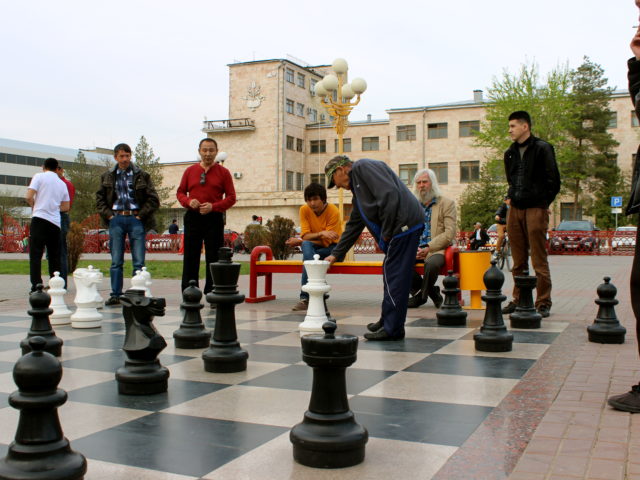Games don’t need to be linked to an existing IP or storyworld to generate enthusiasm, excitement, and narrative. Indeed, they don’t need to start off with any kind of storyworld at all for players to engage with them, obsess about them, and tell stories about them. If they’re good enough, entire industries can pop up, theme parks will be built, and players will dwell on them even more than they will the latest theories about characters from Game of Thrones. Consider the contemporary world of chess, which includes things like a Russian dissident famous for representing humanity against the forces of artificial intelligence, a Kalmykian billionaire with ties to the Nazis who claims to have been abducted by aliens, and an international rivalry between superpowers. It even has its own city, the appropriately named Chess City:
Back in the days of the Silk Road caravans, this is what people might have called a mirage – a huge glass dome, surrounded by a California-style housing development, rising from the parched brown steppe. That shimmering vision has been brought to life here in Elista, the capital of the Russian republic of Kalmykia, a monument to the power of ego over nature, not to mention common sense and even reason. Its name is Chess City. Like a glassed-in Biosphere on Mars, the four-story dome encloses a cool, fresh world of carpets and comfort, of whispers and intense concentration, where the most brilliant minds of chess compete for diamond crowns. For miles around – in fact for almost all the rest of Kalmykia – 300,000 people live in poverty on the barren plains, where tank trucks deliver drinking water and where dried sheep dung, hoarded through the summer, fuels stoves in winter. (New York Times)
Chess City is one expression of how chess seeds the construction of its own strange world simply by being an interesting game to play. Like a sport, chess offers no storyworld to begin with; rather, it is through the play of the game and the accrual of narrative over time that it tells its tales and builds its monuments. This generative capacity is some of the most intriguing (and sometimes dangerous) black magic of game design.




Kalmykia’s alien chessmaster’s chess city http://t.co/8OxxH0XzZz